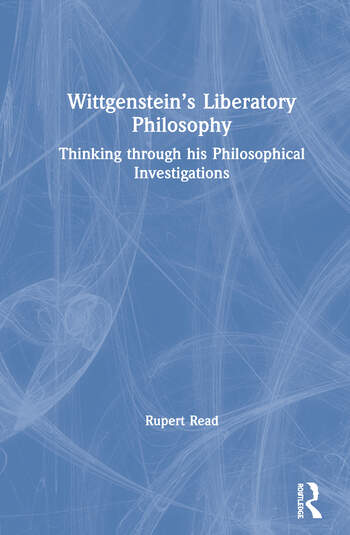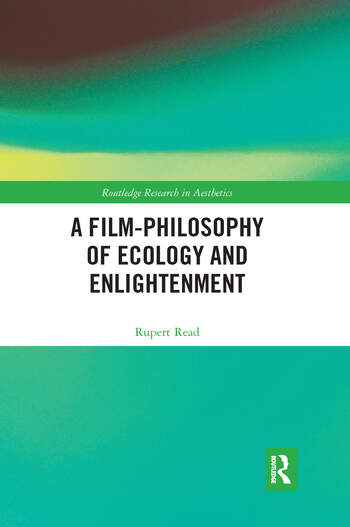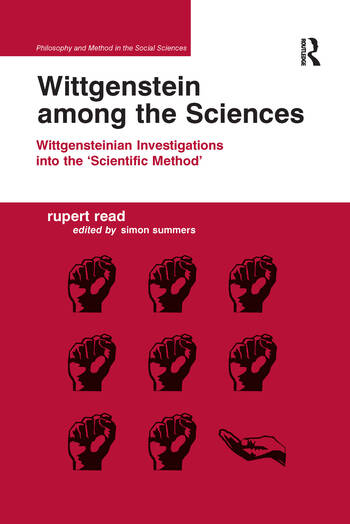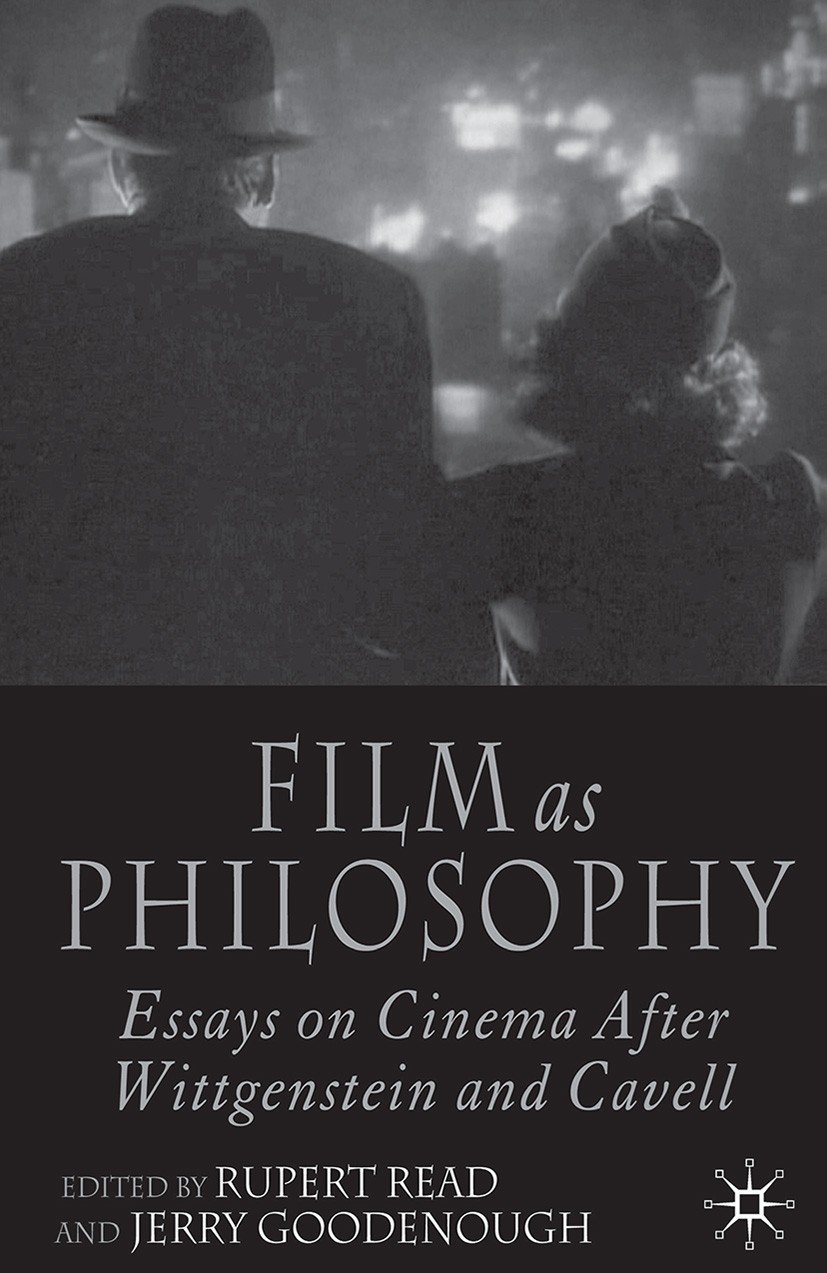
Wittgenstein’s Liberatory Philosophy: Thinking Through His Philosophical Investigations
Wittgenstein’s Liberatory Philosophy is a book authored by Rupert Read and published by Routledge.
In this book, Rupert Read offers the first outline of a resolute reading, following the highly influential New Wittgenstein ‘school’, of the Philosophical Investigations. He argues that the key to understanding Wittgenstein’s later philosophy is to understand its liberatory purport.
Read contends that a resolute reading coincides in its fundaments with what, building on ideas in the later Gordon Baker, he calls a liberatory reading. Liberatory philosophy is philosophy that can liberate the user from compulsive (and destructive) patterns of thought, freeing one for possibilities that were previously obscured. Such liberation is our prime goal in philosophy. This book consists in a sequential reading, along these lines, of what Read considers the most important and controversial passages in the Philosophical Investigations: 1, 16, 43, 95 & 116 & 122, 130–3, 149–151, 186, 198–201, 217, and 284–6. Read claims that this liberatory conception is simultaneously an ethical conception. The PI should be considered a work of ethics in that its central concern becomes our relation with others. Wittgensteinian liberations challenge widespread assumptions about how we allegedly are independent of and separate from others.
Wittgenstein’s Liberatory Philosophy will be of interest to scholars and advanced students working on Wittgenstein, and to scholars of the political philosophy of liberation and the ethics of relation.
You can purchase your copy of Wittgenstein’s Liberatory’s philosophy at Routledge’s website.
Praise for Wittgenstein’s Liberatory Philosophy
“Highly engaging and thought-provoking. Read’s central claim that it is time to cash in the worn-out metaphor of Wittgenstein’s later philosophy as therapy in exchange for a liberatory understanding of his work, together with the detailed readings of the Philosophical Investigations that support it, is likely to provoke much debate” – Edmund Dain, Providence College, co-editor, Wittgenstein’s moral thought.
“This timely, provocative and original reading of Wittgenstein’s Philosophical Investigations argues that the point of his later philosophy is fundamentally ethical and political: to free us from our preconceptions. In pursuing this goal, Read has the courage of his convictions, criticising not only Wittgenstein’s previous interpreters, but even Wittgenstein himself. A reader comes away from this book with a new appreciation of Wittgenstein’s relevance to our current global and environmental challenges” – David Stern, author, Uniersity of Iowa, Wittgenstein’s Philosophical Investigations.
“Rupert Read’s book is a seminal contribution to the conversations that Wittgenstein’s daring approach to the practice of philosophy initiated. It contends that if liberation constitutes the ethical heart of philosophy, and is one of the ultimate justifications of philosophical activity, then philosophy must be conducted in a dialogical, social spirit. Philosophy comes, and must come inevitably, with an ethical attitude. Read presents a radically relational interpretation of Wittgenstein, as distinct from an individualistic one. Wittgenstein is wise when he observes that language cannot be private. Language only has its being in a living cultural context that necessarily transcends the individual. What is less obvious is that if this is true, nor can freedom be a private affair. This is the burden of the courageous book the reader holds in his hands. Read cautions against a passive reliance on an ethical system, as though that exempts us from the active responsibility to be good, something Read quotes Gandhi on. As successive chapters throw light on a wide range of questions pertaining to language, freedom, and the good life, the book serves as an insightful guide to Wittgenstein’s master-work Philosophical Investigations” – Aseem Shrivastava, Ashoka University, author, Churning the Earth: The making of global India.
“Rupert Read has long been one of the most passionate and prolific contributors to contemporary attempts to get Wittgenstein’s way of doing philosophy properly into focus. This systematic engagement with the Philosophical Investigations pulls together his previous work in a way which highlights the unity of its underlying concerns, and clarifies the internal relation between its content and its very distinctive form. For this book presents Read’s eagerness to engage so widely with the work of other commentators, and to make startling connections with writers in other disciplines, all in prose of ummistakable idiosyncrasy, as a sustained expression of his belief that Wittgenstein’s work is meant to attract us to the task of liberating ourselves from compulsions and prohibitions that inhibit our capacity to achieve individuality in community. And if that task requires dispensing with stances central to his earlier writing, or even reformulating Wittgenstein’s own signature concepts and claims – what one might call liberating himself from his philosophical exemplar, and from himself – then Read doesn’t hesitate. It’s a radical embodiment of an ethics and politics of thinking” – Stephen Mulhall, Oxford University, author, Inheritance and originality.
“In this bold and precise book Rupert Read provides a careful reading of Wittgenstein’s posthumously published Philosophical Investigations. The book will obviously be of interest to all Wittgenstein specialists. One hopes it will reach many more readers as well, because Read’s work presents nothing less than a full-scale portrait of the formidable resources Wittgenstein offers for political philosophy. The key to Read’s success is his resolute overcoming of the influential notion that there are two Wittgensteins: One, who was a great philosopher of language, meaning, logic and other topics familiar to professional philosophers, and another, who was a conservative, Viennese critic of progressive modernity. The persistence of this schizophrenic image of Wittgenstein is one of the great scandals of philosophy in our times. Read’s work invites us to read Wittgenstein as a philosopher whose work is indispensable for all who are engaged in the theory and practice of justice, dignity and freedom in the age of ecological crisis and authoritarian capitalism” – Thomas Wallgren, University of Helsinki, author, Transformative philosophy.
“An impassioned and exciting call to see the philosophy of Wittgenstein (and beyond) in a radically new light: as second-person in perspective, transcending the merely subjective or objective, fundamentally ethical in nature, and yet avoiding the pitfalls of ‘philosophy as therapy’. An inspiring work” – Iain McGilchrist, All Soul’s College, author, The master and his emissary.
“Rupert Read’s “liberatory” account of Wittgenstein opens up an exhilarating new way of looking at this philosopher. In his detailed and sympathetic analysis of key sections of Wittgenstein’s Philosophical Investigations Read seeks to show how the idea of liberation from ideologies, ideas, and assumptions that we have adopted unthinkingly is crucial to that text and how Wittgenstein conceives of liberation as an interactive and interpersonal process. In highlighting this aspect of Wittgenstein’s thought, Read seeks to bring out its deep ethical and political significance. We can be sure that the book will stimulate a whole new line of thinking about Wittgenstein’s work” – Professor Hans Sluga, Berkeley, author, Wittgenstein.
“The phrase ‘philosophy as therapy’, especially as a way of looking at Wittgenstein’s philosophical procedure, now tends to elicit either a shrug or a snarl. Rupert Read, like the late Gordon Baker, sees that what is central to Wittgenstein’s analogy with therapy is liberation. On the one hand, those who are genuinely gripped by a picture that they cannot see beyond, or whose craving for generality is so insatiable that they gloss over vital differences, may be freed from such tyranny by ‘the liberating word’; on the other, such freeing is entirely non-coercive: in Waismann’s famous words, ‘There is to be no bullying with the stick of logic or the stick of grammar’. Read, moreover, sees something that Baker never quite did: clinging to Baker’s later work were, in Read’s words, ‘the eggshells of our civilisation’s “individualism” and concomitantly … its reluctance to take the 1st-person- and 2nd-person- plurals seriously’. And, wonderfully, Read does something which Baker almost never did: apart from his work on the disastrously misnamed ‘private language argument’, most of Baker’s later writing was programmatic. In this magnificent book, Read shows in detail how this vision of Wittgenstein’s philosophical procedure sheds new light on all the familiar passages and ‘topics’ in Philosophical Investigations. This is the Wittgenstein book I have been waiting for” – Dr. Katherine Morris, Oxford University, co-author of Descartes’s Dualism.



